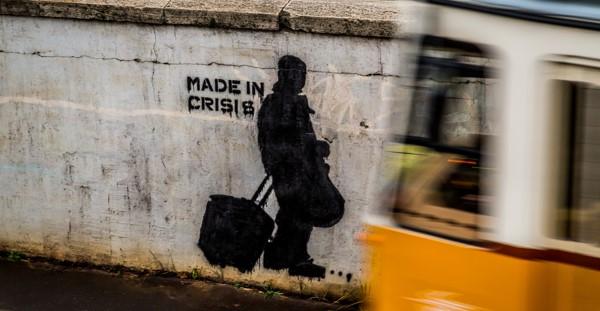While certain restrictions may be easing in the UK, the prospect of a world after Covid-19 still seems to be remote, if it is possible at all. When it comes to shaping the post-virus world, how do we even frame the right questions, and from which perspectives do those questions need to be asked? In the first of a two-part article, Frank Turner SJ surveys the complex political, economic, environmental and civic terrain to which coronavirus has directed our attention, and from which decisions must be made.
From the earliest stages of the global struggle with Covid-19, firstly in China, then elsewhere, ill-prepared governments were scrambling to formulate policies balancing such intractable imponderables as ‘lockdown versus openness’, weighing the dangers of a health catastrophe against those of wrecking the economy. The stakes could hardly have been higher. Early estimates of possible deaths from Covid in the UK spoke of 500,000. On the other hand, the World Bank judges that the pandemic ‘has triggered the most widespread global economic meltdown since at least 1870 and risks fuelling a dramatic rise in poverty levels around the globe’.
From the outset, too, long-term questions were emerging about the ‘post-Covid’ world. Such questions risk wishful thinking. Will the world indeed ‘emerge from crisis’, or are we now compelled to recognise that the concept of a ‘crisis-free existence’ is mere complacency? A public health specialist estimates that, even given a promising new treatment for those with severe symptoms, we must learn ‘to live with this virus for the months and years to come’. In any case the language of a ‘return to normality’ implies a complacent myopia that can prescind from violence and mass suffering elsewhere: the reality of 5.4 million lives lost by violence over the decade of civil war and its aftermath in the Democratic Republic of Congo, for example, rarely troubled news media in the UK or USA.
Perspective, too, is crucial. What ‘world’ are we discussing, and seen from where? From China or Central America, or Amazonia? From Wall Street or Westminster? We need a typology of crises. We cannot dispense with the perspective of global poverty and inequality. But urgent security issues also arise. The Council of Europe’s Committee on Counter-Terrorism has warned that the global coronavirus outbreak could encourage the use of biological weapons by terrorists. Their potential harm far outweighs ‘conventional’ attacks and currently the world’s government and security resources are severely stretched. Similarly, imagine the devastation inflicted by a successful cyber-attack on a country’s healthcare system.
The world does not face crises one at a time. If we can postulate ‘a time after Covid’, that time will also follow a US presidential election in November that could profoundly affect geopolitics for the next few decades, and it will postdate the outcome of the Brexit process that will shape the UK’s future no less than will the impact of the pandemic. It may (or may not) postdate the surge in social turmoil provoked by the killing by Minneapolis police of George Floyd. (It seems emblematic of the clash of priorities and perspectives that ‘Black Lives Matter’ demonstrations were themselves criticised for undermining the practice of physical distancing.) Certainly, the crisis will not displace the even more formidable impact of climate change and environmental destruction. All these — and other, still unsuspected, forces – will constantly interact.
Taking a broad view naturally risks becoming unduly abstract, deflecting attention away from facing immediate challenges, especially where they divide countries and/or scientific opinion. Take the British government’s recent decision about whether to curtail or to prolong ‘lockdown’. An extended article of 10 May in The Atlantic argues that ‘minimizing the number of Covid-19 deaths today or a month from now or six months from now may or may not minimize the human costs of the pandemic when the full spectrum of human consequences is considered’. We can judge securely only on hindsight, yet decisions must be made now. In any case, the future on which we speculate depends not least on how we respond in the present, just as the theological virtue of hope differs radically from ‘optimism’, since such hope can only be rooted in God’s faithfulness, as it inspires our own faithfulness.
Nevertheless, there can be no understanding without taking the long view, and without taking multiple perspectives. No one can forecast future outcomes, but it is possible to anticipate future dilemmas and choices, to identify what factors might make a crucial difference.
Politics
Political debates about the responsibilities of the state and about its appropriate limits often proceed according to two traditional polar positions:
- a ‘neoliberal’ position: governmental planning is the least effective and the most wasteful way to manage societies. The rightful primary role of the state is to facilitate the more efficient working of the market and then get out of the way;
- a ‘social democratic’ position: state responsibility for the economy (as for the maintenance of law and order, etc.) is an inalienable function: only a government, overseeing state institutions, has the mandate and duty to care for the overall public good.
Both positions face the difficulty that, in the modern world, states often find themselves relatively helpless against transnational corporations, globalised finance, and challenges that transcend any state such as climate change, the movement of peoples and transnational taxation. In 2020 we have learned, first, that no one (and no commercial corporation) is a free-marketeer in a crisis. The corporate world accepts that government regulation and control is legitimate and vital. Simultaneously, the same corporations (and citizens) depend on the state to bail them out (for instance by paying furlough), just as citizens depend on the state to support us in our personal need.
We have also discovered that many transnational structures are too shaky to provide either global governance or universal support. Thus, in this crisis, both the power and the prominence of single states has dramatically increased (for better or worse). Maurice Glasman argues that the virus has ‘sounded the death knell for liberal globalisation’.
This thesis needs to be qualified. The crisis has strengthened some of the largest corporate oligarchies (Amazon, Facebook, et al.), and there is no sign that global finance has surrendered its power to avoid reasonable levels of national taxation. We can suppose that the biggest corporations are well-placed to profit, whether vulnerable competitors collapse or are resuscitated.
We also continue newly to realise how much depends on the ethos and competence of each single state. Evidently, some states have managed the Covid crisis far better than others: the governments of South Korea and Taiwan, for example, responded much more effectively than did the UK, though with no additional notice of its dangers. In the Times Literary Supplement (‘Models and Muddles’, 24 April 2020) the economist Paul Collier commented on the sense of British exceptionalism that inhibited the government from learning from the world beyond the anglosphere.
The more fundamental danger remains that of ultra-authoritarian states, or reckless leaders. After a culpably slow start, then a reflex denial mechanism, the Chinese government seems to have responded effectively to Covid. But there are legitimate fears that its efficacy rests on a surveillance capacity that bodes ill for the future. In El Salvador, an initially popular president now seems now ominously out of control.
The ideal, of course, is that states will cooperate for the universal good, not least through accepting that their autonomy may be qualified by the international order. That ideal — as shown in the US President’s drastic attack on the World Health Organisation, an attack which will impact tragically on millions of people in Yemen and elsewhere — remains remote.
Economics
Adam Tooze, author of Crashed, a respected book on the financial crisis that exploded in 2008, notes the dynamic of the early phase of the present crisis. Government intervention on a scale unprecedented in peacetime has inevitably threatened governments’ own finances. We suddenly find that at the heart of the global economy (driven by the commercial imperatives of growth and profitability) lies a public institution – the central bank, normally functioning discreetly but now thrust into prominence as lender of last resort even to governments.
In May, for example, after much hesitation, the European Central Bank mounted a ‘pandemic emergency programme’, buying up €750 billion of government and corporate debt. Tooze explains that these central bank instruments of the EU and the USA have so far proved robust enough to cope. However, we are by no means safe: I mention four factors.
- We do not know whether these interventions have stoked government debts so massive as to hamstring public policy for decades. Are we doomed again to the ‘austerity’ that has widened wealth inequality even since 2008?
- We do not know whether the steps taken so far will suffice to withstand any worsening of the crisis in the West – an outcome that is entirely possible, since no end is in sight. (The World Trade Organization forecasts that world trade could fall by as much as 32% in 2020.)
- There is every sign that Covid has exacerbated social inequalities, not flattened them. The Economist has pointed out that the surge in unemployment caused by the decline of heavy industry, mining and so on primarily affected male employment (dramatic inequalities were regional): in the present crisis, however, employed women have been far more at risk than men. They are over-represented in the service and retail sector, where jobs demand personal contact with clients and therefore cannot be done from home, and which have not been deemed essential.
- The most pressing question of all: what of poorer countries and the entire developing world? Their central banks cannot possibly support governmental intervention on the required scale. No ‘furlough’ arrangements will be offered to millions of agricultural workers in lockdown. No ‘physical distancing’ is possible in a favela. What scale of sharing might be adequate, who can say? Gordon Brown has called on the G20 to establish a ‘coronavirus fund’ of $2.5 trillion. (By comparison, Brown University in the USA estimates that the USA’s costs in Iraq, from 2003 to 2010, a period covering the war and the subsequent military occupation, were $1.1 trillion.)
In a recent interview with the Quaker Council for European Affairs, Professor Cynthia Enloe pointed out the vapidity of any political rhetoric, in seeking support for painful decisions, that ‘we are all in this together’. We may all be in the same stormy sea. But we are far from ‘in the same boat’: some are in leaky and overcrowded dinghies, others in luxury yachts with well-stocked bars. A shared crisis does not ensure solidarity, governments respond disproportionately to lobbies with power, and the market does not correct anomalies.
Environment and climate change
A common reporting theme over these last months has been an amazing side-effect of Covid-19, as the natural world has reasserted itself with unimaginable speed. Fish swim in the canals of Venice, the citizens of Los Angeles can see the San Gabriel mountains clearly in suddenly unpolluted skies. On 15 May the editorial of the Financial Times noted that the virus may trigger the largest ever annual drop in carbon dioxide emissions. (If we think in terms of ‘integral ecology’, we must add that, in health terms, this fall in emissions is estimated to have assisted some two million patients with lung problems, in the UK alone.) It is both symbolic and prosaically accurate to state that Covid attacks the lungs.
We know that temporary benefits (such as the alleviation of noise levels for those living near airports) are quickly reversible, so in the long run all depends on the prevailing vision of economic development.
The US academic and activist Bill McKibben, in a recent article in the online journal Literary Hub, identifies one hopeful trend that needs to be mainstreamed. Since public transport cannot function as it currently does whilst requiring a sufficient degree of physical distancing (especially in cities the size of London), cities have a choice: permitting unrestricted car use (until the system seizes up); or do what is being planned in Milan, and even in London – establish a central zone closed to traffic fed by enhanced pedestrian and cycle priority, with efficient public transport. (This part-solution, however, seems hardly conceivable yet for the developing world.)
Second, can the millions of unemployed find work in converting our energy systems from fossil fuels? This can happen given the political will, at least up to a point. However, the ‘political will’ itself requires popular support – as Franklin D. Roosevelt is said to have advised a group of lobbyists: ‘OK, you’ve convinced me. Now go out and put pressure on me.’ I shall return to this point. Third, to what extent can the immense government subsidies given in many countries to fossil fuel industries, and extended to the airline industry, be redirected to essential public services such as prisons, care homes and indeed environmental protection?
However, ominous signs are plentiful, and I cite one example. In June 2020, Dominic Preziosi reported in Commonweal (Vol 147, No 6) that the reduction in carbon emissions in the USA in 2020 could be as much as eleven percent, thanks to the effective shutdown of coal-fired power plants, both dirty and hugely expensive to run even in periods of normal electricity demand. Meanwhile, however, in March, as the USA went partly into lockdown, ‘the White House announced the rollback of Obama-era automobile fuel-efficiency standards, a move that will lead to the release of a billion more tons of carbon dioxide’. Worse still, in late May, the director of the Environmental Protection Agency (of all bodies) was drafting ‘new rules that would legally enshrine business interests, not public-health benefits, as the primary measure in evaluating compliance with environmental regulations’; a move that could potentially hamstring even future administrations.
Civic and political culture
The cultural historian, Yuval Noah Harari, recently wrote a stimulating extended commentary in the Financial Times on ‘The World after Corona’. He discusses ‘the biggest crisis of our generation’:
… the decisions people and governments take in the next few weeks will probably shape the world for years to come. They will shape not just our healthcare systems but also our economy, politics and culture. We must act quickly and decisively. We should also take into account the long-term consequences of our actions.
The previous sections have illustrated what an extraordinary demand Harari here makes on governments. He is right to stress that an extraordinary experiment is taking place under pressure. We do not understand the consequences of requiring social and commercial life to proceed only at a safe distance, or through virtual technologies, or for universities to teach online while maintaining student fees at previous levels. We can hardly imagine the long-term implications when governments confine populations to their homes, and subsidise thousands of businesses and millions of salaries for months on end. It is an experiment without a control group. In normal circumstances such steps would seem outrageous – and they may be discredited in retrospect. However, notes Harari rightly, ‘the risks of doing nothing are bigger’. He identifies two structural tensions, with illustrations.
1. The first is between ‘totalitarian surveillance’ and ‘citizen empowerment’. China is manifesting its unique capacity to bring the pandemic under control, notably by means of tracking technology. Harari discusses the imminent prospect of ‘under-the skin’ surveillance, imagining a (hypothetical!) government that required citizens to wear biometric bracelets that recorded body temperature and heart rate. The state would know not only who you met (as it already probably does), but ‘what makes you really, really angry’. If the algorithm shows that some governmental statement infuriates you, what then? Arrest you as a dissident? Harari cites not only China but also Israel, where the government has still failed to withdraw many of the ‘emergency measures’ imposed in … 1948. No doubt the surveillance capacity of the USA or the UK is no less.
To this chilling prospect Harari opposes ‘citizen empowerment’, pointing out that Taiwan, Singapore and South Korea gained widespread civic consent for tracking measures to guard against the virus. He jokes that most of us use soap to defend against infection, without the intervention of the ‘soap police’! He believes that, if citizens can fundamentally trust their governments, citizen enlightenment can rise to the challenge.
However, this ‘if’ is momentous; and Harari does not discuss the twentieth-century history that renders such trust so elusive. Citizens might willingly surrender certain freedoms in the short term, since privacy concerns may be trumped by health concerns: only, however, given the confidence that these freedoms were not permanently at risk. But how could trust be built between citizens and a totalitarian government, the case he postulates? He suggests ‘that the same surveillance technology can usually be used not only by governments to monitor individuals — but also by individuals to monitor governments.’ Really? Whistleblowers suffer a harsh fate. It may be just conceivable that citizens’ movements could track governments. But the governments in question would swiftly crush such movements.
2. The second of Harari’s tensions is that between ‘nationalist isolation’ and ‘global solidarity’. Governments, he suggests, need to learn from each other far more readily than they do, and ‘to be able to trust the data and the insights they receive’. Only governmental cooperation can match skilled personnel to the regions where they are most needed, or facilitate medically essential international travel by pre-screening travellers in their own countries.
The improbable adoption of this suggestion would probably remedy certain glaring failures of public policy. However, its scope is limited. Despite his passing reference to the pooling of medical personnel with the worst-hit countries, Harari nowhere refers to Africa, South Asia or Latin America. When he writes of ‘solidarity’, he seems to mean international cooperation amongst technologically advanced societies, which serves each nation’s enlightened self-interest. Willing cooperation would be far preferable to systemic suspicion. But it is far short of ’solidarity’ which, in the writings of recent popes, implies that others’ suffering is experienced as our own, so that we may stand with them even at great personal cost.
Another element, recently much discussed and crucial in shaping our future, is the quality, of ‘resilience’. In conversation recently, a colleague identified to me three aspects of psychological resilience: (1) the capacity to face squarely whatever challenge or ordeal we face; (2) to find meaning in those realities, and in our responses to them; (3) to respond creatively, showing that we are not deprived of inner resources.
The term ‘resilience’ is also commonly applied in the field of international development. A usefully broad definition is that of USAID: ‘the ability of individuals, households, communities, institutions, nations, or even value chains and ecosystems to withstand crises, recover from them, and adapt so as to better withstand them’. Its dimensions include disaster response, capacity-building, endurance under prolonged pressure. It can be a property of systems, as well as a fundamental quality of the human spirit. In the latter case, as opposed to the former, it is most likely to be found in regions and amongst communities who have not been led by their experience to consider comfort and security as the norm.
In the case of Covid-19, in the article already referred to, Paul Collier characterises resilience as ‘the speed at which an ecosystem recovers after a disturbance’. Crucial are the factors of diversity and adaptability. However, suggests Collier, ‘our economy has rewarded razor-thin efficiency in the recent past’ But ‘razor-thin’ margins ‘offer no buffer in the face of disruption’, as we have seen in the case of some global supply chains. We need, therefore, to shape our social and economic systems to encourage resilience, ‘anti-fragility’. And we need to resist any facile aspiration to return to a ‘normality’ that has become both irrational and unethical.
In these last months, the dignity of labour has been recognised even by governments that traditionally favour business, which often denigrated trade unions. Government ministers have eulogised ‘essential workers’, often the least privileged, poorly paid and politically excluded.
Yet it remains true that workers’ remuneration and negotiating status, over against managements and boards have not been realigned. Amongst the groups hardest hit by Covid have been those euphemistically called ‘self-employed’, meaning contract workers without rights or social protection.
It seems symbolic that, after his Covid illness, Boris Johnson singled out his two closest medical carers for grateful praise; one came from Portugal, one from New Zealand. Yet Mr Johnson’s government almost immediately repeated its insistence that employment visas would favour those immigrants who earned £50,000 or more. About the same time, the government’s rejection of low-paid EU nationals was followed by the scramble to allow them back in temporarily to harvest our crops.
The ‘normal’ that constituted our prosperous Western European social world was itself a problem, an absurd illusion, the very condition of our fragility and vulnerability. What we have admired most during Covid has emerged from social partnership, not market competition. Frances O’Grady, General Secretary of the TUC cited non-controversial examples: ‘people staying at home to protect our NHS, businesses and unions working together to keep people in their jobs, manufacturers switching production to life-saving ventilators, neighbours all over the country shopping for older people nearby.’
Not least, the government brought unions and civil society into policy discussion, as well as business leaders. A return to the so-called normality of a minimum wage that kept workers in poverty, of zero-sum contracts, would dissolve the social capital that has been generated. The radical loss of power experienced by the unions in the last decades has left many workers unprotected against the excesses of corporate power.
Frank Turner SJ is a fellow in political theology at Campion Hall, University of Oxford.






